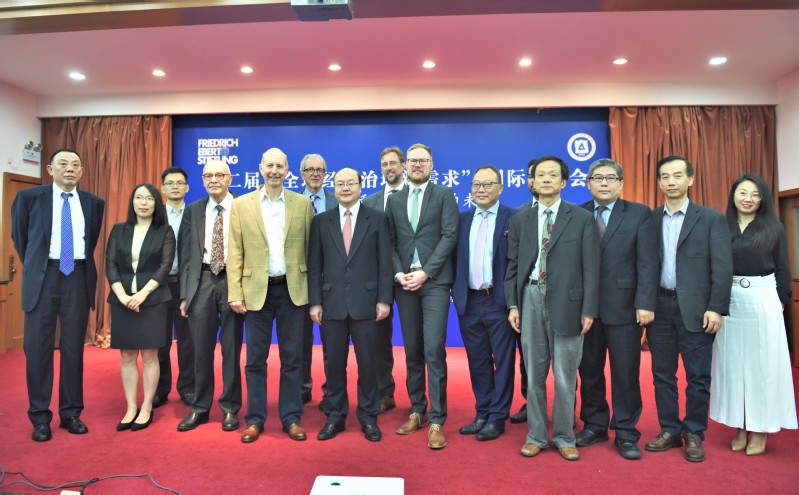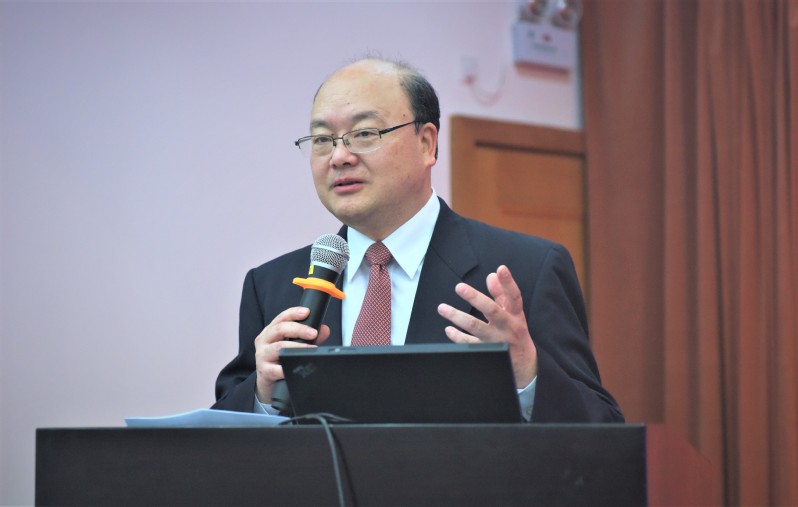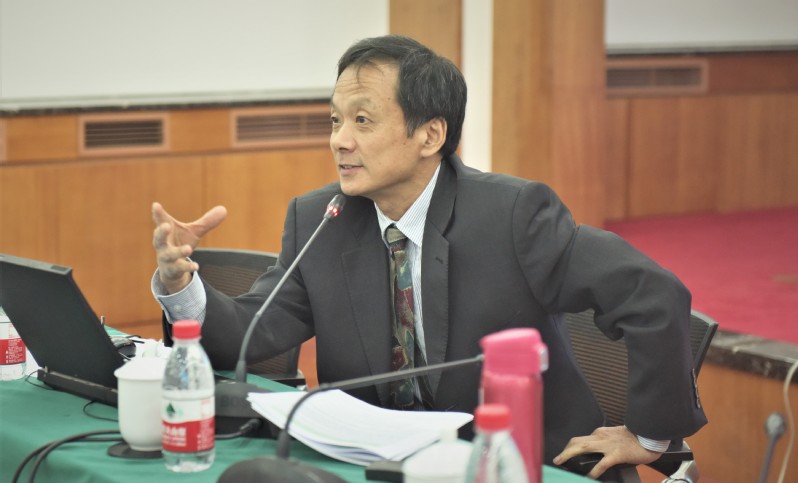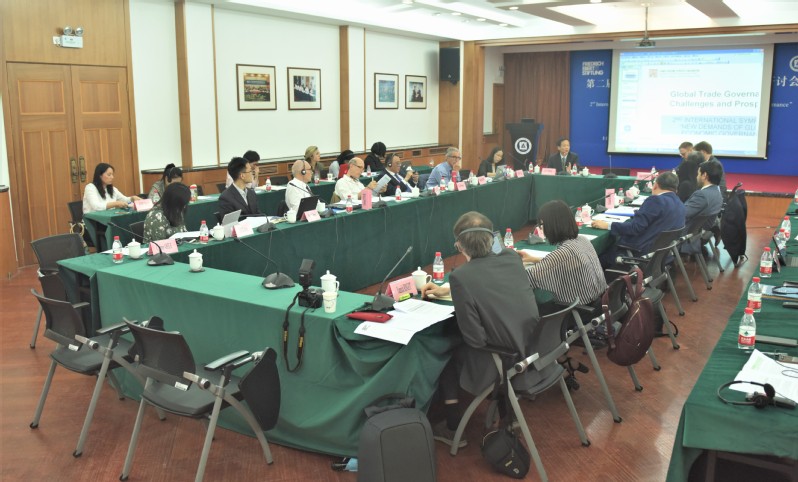The 2nd International Symposium
on the “New Demands of Global Economic Governance”
was held at the Shanghai Academy of Social Sciences
On June 23, 2018, the 2nd International Symposium on the “New Demands of Global Economic Governance” was held at the Shanghai Academy of Social Sciences (SASS). After a first successful symposium on the international financial system and the financing of development and infrastructure, the theme of this second symposium was “The Future of International Trade and Investment System”. This is one of the three-part series of symposiums on the “New Demands of Global Economic Governance” jointly sponsored by the Friedrich-Ebert-Stiftung (FES) and the SASS. The two sides plan to hold the third international symposium on international trade and cross-border investment in early 2019.
Experts and scholars from the WTO Secretariat, Lowy Institute, US-China Economic and Security Review Commission, the Chinese University of Hong Kong, Singapore Management University, Peking University, Chinese Academy of Social Sciences, China International Trade Association, Wuhan University, Shanghai Institute for Strategy of International Trade Center,Center for American Studies of Fudan University ,Shanghai University of International Business Economics and SASS conducted in-depth discussions and exchanged views on the challenges and perspectives of the international trade and investment system and the relationships between its major actors.

Professor LiuMing, Director of Institute of International Relations, SASS, moderated the opening ceremony. Professor Wang Zhen, Vice President of SASS and Stefan PANTEKOEK, Resident Director of FES Shanghai Representative Office attended the symposium and delivered welcome speeches. In his speech, Professor Wang Zhen pointed out that the world economy is undergoing an unusual period of upheaval and transformation. Thus, the global economic governance is more important than ever. As unilateralism prevails in the United States, international trade and investment systems are facing unprecedented challenges. China will make further reform and opening up to better contribute to safeguarding the integrity of the open, rules-based multilateral trading system. As one of top 25 national high-level think tanks, SASS will give full play to our own advantages and make extensive and in-depth cooperation with all walks of life to jointly build an academic and think tank community, endeavor to promote world economic growth and improve global economic governance.

Stefan PANTEKOEK said that the global economic landscape has undergone profound changes. Further globalization is increasingly resisted in many parts of the world. As the second-biggest economy, the world expects China to play a pivotal role in safeguarding the multilateral trading system and promoting the balance of the world economy. FES hopes to contribute to the sustainable development of the global economy through strengthening international exchanges and cooperation.
US President Trump’s intensified unilateralism dramatically increases the uncertainty of the United States' foreign trade policy, not only brings new problems and challenges to Sino-US economic and trade relations, but also severely endangers international economic order. The international situation is witnessinghistorical changes and the negative consequences of anti-globalization are becoming more visible. Addressing these challenges require new levels of sophistication from policymakers across the globe- particularly where the mechanisms, institutions and policies of global economic governance are concerned.
In the course of the symposium, professor Tim SUMMERS, Centre for China Studies, the Chinese University of Hong Kong, emphasized the changing relationships between the strategic and economic elements of international politics and global political economy. He pointed out that “offensive realism” represented by John Millsheimer argues that with the rise of China's economy, China will inevitably attempt to dominate Asia, resulting in “intense security competition with considerable potential for war”. Treating China as the most serious and long-termstrategic competitor who will structurally-determined to challenge the current American-led international system, this sort of approach takes us into the realms of Power Transition Theory, and that brings with it a significant risk of conflict. Indeed, the recent restrictions placed on ZTE by Washington demonstrate that Chinese companies are heavily reliant on the US and others through their dependence on global supply chains. The commercial agreement between American companies and Chinese companies does not constitute a “compulsory technology transfer” under the WTO framework. Besides, as a minority of commentators in the US have pointed out, commercial agreements between US and Chinese companies do not constitute “forced technology transfer”, and China’s industrial policy is little different from that practiced by others in the past.
Roland RAJAR, Director of International Economy Program, Lowy Institute, also stated that China as a catch-up economy, has adopted a similar strategy to other Asian economies and the US itself when at a catch-up stage of development. In addition, China has already paid the costs for the foreign intellectual property. Besides, the overall trade deficit between the two sides reflects macroeconomic factors and efficient distribution of global production across countries. China has largely displaced rest of Asia in US trade. What’s more, the bilateral deficit should cover the US trade surplus in service trade and be based on value-added basis. Therefore, the actual surplus accounts for about 1% of GDP rather than about 2% of GDP.In fact, US has benefited a lot from its deficit economy, lowered costs and raised real incomes around the world. Using trade policy to shrink the bilateral deficit will only succeed by shifting it elsewhere, generating inefficiencies and lowering global welfare. And the current CFIUS national security review considers too many political factors. The geostrategic element has significantly changed the game. Compared with the trade deficit issue, technological and geostrategic competition between China and the US will exist for a long time and both countries would be damaged by a “trade war” or lead to a deep split.
With respect to the current Sino-US trade frictions, professor Song Guoyou, deputy director of the American Studies Center, Fudan University, stressed that Chinese acquisitions and investments in the U.S. fell 92 percent to just $1.8 billion in the first five months of this year, which is a very dangerous signal. In the event of a conflict between China and the US in the future, the buffer provided by capital would be lost. At a critical moment of transition at the apex of global power distribution, trade friction between China and the US is quite normal. If China and the US can achieve a new equilibrium in strategic interaction through this collision, it is not that bad. However, if the conflict is not well-managed, if we adopt a too realist interpretation of Sino-US Relations,it could possibly result in an aggravation of security competition dynamics and the “self-fulfilling prophecy” would become true. Both China and the US should adopt a cooperative attitude to properly resolve the frictions between the two sides, redistribute the economic interests at a new height.
As to the prospects of the world economy and multilateral trading system, professor Gerhard STAHL, HSBC Business School of Peking University believed that the center of economic gravity of the international economy has been gradually shifted to emerging countries, especially to Asia. The interdependence of economies will continue to increase and the digital economy will become a mayor driver of a new industrial revolution. Countries share a reliance on common resources like the environment and global security and these resources can be damaged by the actions of a single country. As global flows bind our world together, the need for internationally coordinated policy becomes ever more pressing.
Rudolf ADLUNG, an independent trade policy analyst and former senior economist in the Trade in Services Divisionof the WTO Secretariat, pointed out that the heterogeneity of members and the decentralization of world power, the lack of consensus and political momentumamong members to promote the new agreements, lead to unprecedented crisis of multilateralism. In order to push the multilateral trading system forward, countries must ensure compatibility and consistency across policy initiatives, eliminate WTO-minus obligations in RTAs, use “open plurilateral” for conceptual innovation and liberalization to keep WTO alive.
In addition, many experts, including Li Yong, Deputy Chair of China Association of International Trade, held the viewthat Trump administration's trade protectionism severely destroys US-EU relationship, brings dramatic impacts on the existing international economic order and the free world.As one of the America's “traditional allies”, whether the EU would accept the Trump administration's trade protectionism, the trend of US-EU relationship is crucial to both global economy and free world order. At the same time, there is huge potential for China-EU economic and trade relations. Both sides should seize the emerging historical opportunity, relate each other in a bigger context with bigger picture, inject fresh elements for a more balanced and positive trade relationship, achieve mutual benefits and win-win results.
Finally, Director Liu Ming and Stefan PANTEKOEK summarized the symposium. Liu Ming claimedthat Trump's American First nationalism brought chaos to international economic order and disrupted global economy. Both China and the US have serious structural economic problems and should make structural adjustments at the domestic level. Resort to unilateralism and protectionism cannot address the current predicament. The correct approach is to deal with the trade friction within the existing WTO framework. China will continue to reform and open up, support the multilateral trading system, gradually expand the role of domestic demand in driving its economic growth. Stefan PANTEKOEK pointed out that this symposium analyzed the challenges of international trade and investment from the perspectives of both strategy and international political economy, paid attention to the latest trends, especially the current backlash against globalization. All countries must fully recognize the complexity of nationalism, populism, and the lack of leadership in the multilateral system as well.
(Thanks are due toRuthie Brady and Kory Gentle, 2018 Summer CET interns, for their contributions to this article.)

